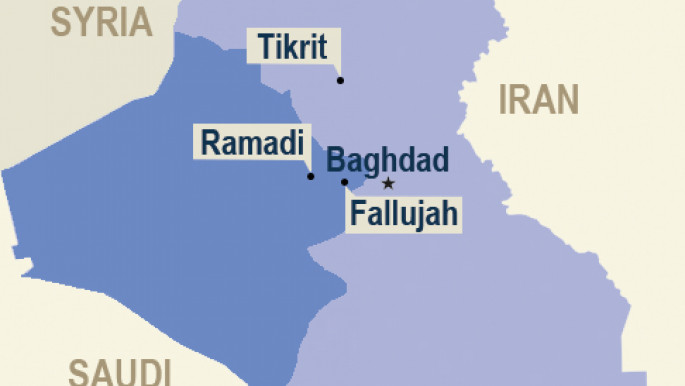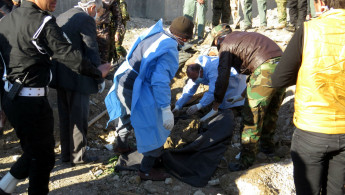Mass graves unearthed in Iraq's Ramadi
Two mass graves have been found on Tuesday in the Iraqi city of Ramadi, which was liberated from Islamic State militants a few months ago.
3 min read
Mass graves were previously found in Ramadi in January [Getty]
Iraqi police on Tuesday unearthed two mass graves in the western city of Ramadi, with bodies of about 40 people killed by Islamic State militants during the militant group's reign of terror in the city, officials said.
The officials said IS militants who were captured and arrested after Iraqi forces routed the extremists from the Anbar provincial capital led authorities to the site of the mass graves, inside the city's soccer stadium.
Bodies of women and children were among those found in the two graves, along with bodies of men in civilian clothes, said the officials, speaking on condition of anonymity because they were not authorised to talk to reporters.
Ramadi, the provincial capital of Anbar, fell to IS in May, a major setback for US-allied Iraqi forces at the time. It was liberated in December.
In March, a UN team announced that the state of destruction in Ramadi is the worst than anywhere else in Iraq. They visited the ravished city for the first time since its recapture from Islamic State [IS] group in December by pro-Baghdad forces.
The damage was described by the group as "staggering" with the city's central hospital and main train station a pile of rubble, as are thousands of other buildings in the city.
"The destruction the team has found in Ramadi is worse than any other part of Iraq," said Lise Grande, the UN humanitarian coordinator in Iraq. "It is staggering."
There have been many instances of mass graves being uncovered in territory wrested from IS militants in Iraq and Syria - thousands of people have been killed in summary and extrajudicial killings by the Sunni militants and the graves have been a dark testimony to the group's brutality.
In June 2014, some 1,700 Iraqi soldiers were captured and then killed by IS militants when they overran Saddam Hussein's hometown of Tikrit.
At the time, the soldiers were trying to flee from Camp Speicher, a nearby army base where they were deployed.
Mass graves with hundreds of Iraqi soldiers' bodies were found after the city was liberated in April 2015.
In December, the UN human rights office in Iraq said it received reports of 16 mass graves discovered near the town of Sinjar after it was liberated from the Islamic State group the previous month.
Among the first mass graves uncovered in Sinjar - within days of IS forces being pushed out of the town - was one near the town's center that has been estimated to contain the bodies of 78 elderly women, and another, about 15 kilometers (10 miles) outside of Sinjar, with between 50 and 60 bodies of men, women and children.
The UN uses the term mass grave to refer to a location where three or more victims of what the world body defines as extra-judicial, summary or arbitrary executions are buried - not those who have been killed in combat, attacks such as bombings or armed confrontation.
Agencies contributed to this report
The officials said IS militants who were captured and arrested after Iraqi forces routed the extremists from the Anbar provincial capital led authorities to the site of the mass graves, inside the city's soccer stadium.
Bodies of women and children were among those found in the two graves, along with bodies of men in civilian clothes, said the officials, speaking on condition of anonymity because they were not authorised to talk to reporters.
Ramadi, the provincial capital of Anbar, fell to IS in May, a major setback for US-allied Iraqi forces at the time. It was liberated in December.
In March, a UN team announced that the state of destruction in Ramadi is the worst than anywhere else in Iraq. They visited the ravished city for the first time since its recapture from Islamic State [IS] group in December by pro-Baghdad forces.
The damage was described by the group as "staggering" with the city's central hospital and main train station a pile of rubble, as are thousands of other buildings in the city.
 |
In June 2014, some 1,700 Iraqi soldiers were captured and then killed by IS militants when they overran Saddam Hussein's hometown of Tikrit. |  |
There have been many instances of mass graves being uncovered in territory wrested from IS militants in Iraq and Syria - thousands of people have been killed in summary and extrajudicial killings by the Sunni militants and the graves have been a dark testimony to the group's brutality.
 |
|
In June 2014, some 1,700 Iraqi soldiers were captured and then killed by IS militants when they overran Saddam Hussein's hometown of Tikrit.
At the time, the soldiers were trying to flee from Camp Speicher, a nearby army base where they were deployed.
Mass graves with hundreds of Iraqi soldiers' bodies were found after the city was liberated in April 2015.
In December, the UN human rights office in Iraq said it received reports of 16 mass graves discovered near the town of Sinjar after it was liberated from the Islamic State group the previous month.
Among the first mass graves uncovered in Sinjar - within days of IS forces being pushed out of the town - was one near the town's center that has been estimated to contain the bodies of 78 elderly women, and another, about 15 kilometers (10 miles) outside of Sinjar, with between 50 and 60 bodies of men, women and children.
The UN uses the term mass grave to refer to a location where three or more victims of what the world body defines as extra-judicial, summary or arbitrary executions are buried - not those who have been killed in combat, attacks such as bombings or armed confrontation.
Agencies contributed to this report





 Follow the Middle East's top stories in English at The New Arab on Google News
Follow the Middle East's top stories in English at The New Arab on Google News
![Both Hamas and the Palestinian Authority welcomed the ICC arrest warrants [Getty]](/sites/default/files/styles/image_330x185/public/2024-11/GettyImages-2178351173.jpg?h=199d8c1f&itok=TV858iVg)

